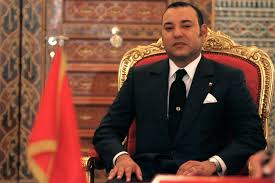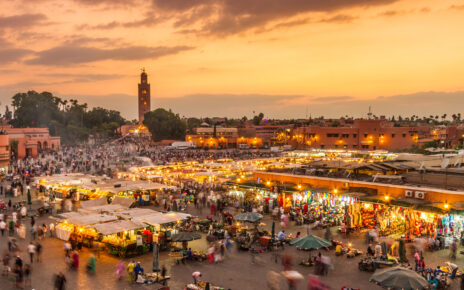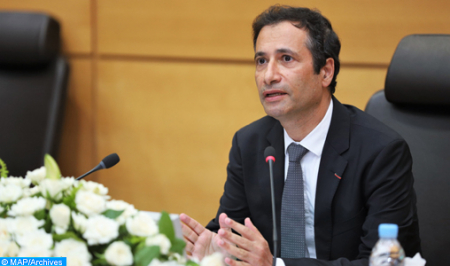 King Mohammed VI made the case, in a speech to the African Union leaders, for the emergence of a “New Africa” that is able to turn its youth potential and the institutional challenges it faces into development opportunities.
King Mohammed VI made the case, in a speech to the African Union leaders, for the emergence of a “New Africa” that is able to turn its youth potential and the institutional challenges it faces into development opportunities.
In the speech, read out by the King’s brother Prince Moulay Rachid at the 29th African Union Summit, the Monarch reaffirmed faith in the continent, reiterating Morocco’s commitment “to contribute to the emergence of a New Africa; a strong, daring Africa that defends its interests; an Africa that is influential on the world stage.”
The Moroccan Monarch, who paid over 50 visits to nearly 30 African countries since coming to power in 1999, stressed that the New Africa he yearns for should break away with ideological slogans in favor of a “a solid, pragmatic vision.”
The King pointed to a host of pressing challenges that Africa needs to overcome, on top of which security challenges marked by the surge of non-state actors and the proliferation of transnational terrorism and violent extremism.
Addressing such challenges requires collective efforts. Therefore, the King highlighted the importance for a “metamorphosis” of the African Union conducive to ushering “concrete, resolute action in peace-building, security and human development.”
Key to Africa’s emergence is institutional overhaul, noted the king, specifying that the reform of African institutions should be geared to “enable the continent to respond fully and decisively to the challenges faced.”
In this respect, he pointed to the pertinence of the proposals submitted by Rwanda’s President Paul Kagame in a report, “which contains crucial recommendations for finding solutions guaranteeing the future of the African Union.”
The King added that Morocco, alongside sister nations, advocates a “transformative vision of the African Union” that entails a reform of the African Union. Describing the continental organization reform as a flagship project, he promised that Morocco would be actively involved in this reform project.
“Our institutional family must aim for greater efficiency and a streamlining of the pan-African organization in order to be in step with the expectations of African populations,” he explained, emphasizing the urgent character of such a reform in order to address the “enormous stakes involved and the immense challenges to which our continent must rise.”
In his speech, the King also attached a special attention to the pressing issue of youth-policy as a lever for the emergence of a new Africa. He underscored the need for using the demographic dividend to add impetus to the continent emergence.
Youth is “a godsend for Africa; it makes it possible for the continent to benefit from a young, educated and abundant labor force to drive the continent’s economic growth,” he said, noting that African youth aged between 15 and 24 will reach 400 million by 2050.
The Monarch gave statistics showing the scale of unemployment on the continent where 11 million young Africans enter the job market every year but only 3 million find work.
Education, according to the King, represents an adequate solution to unlocking youth potential in the continent through the adoption of “a proactive policy whose three watchwords are education, higher education and vocational training of the highest quality.”
King Mohammed VI urged in this vein that sustained and judicious investment be geared towards education, health, vocational training and employment. “Investing in young people, who account for nearly two-thirds of Africa’s population, is crucial. It calls for appropriate training, smooth, well-regulated integration into the job market and the ability to take initiatives in order to create wealth, to showcase one’s talents and to contribute to the continent’s progress and development.”
Creating jobs and offering promising prospects for the youth is instrumental in hampering the recruitment of unemployed youth by rebel movements and extremist or terrorist groups, which are present throughout the continent, King Mohammed VI said.
Also related to youth, is the issue of migration. The Moroccan monarch regretted that migration whether legal or illegal inflicts an unjustified loss of a precious resource for Africa.
“As the Leader who, at the 28th AU Summit, was put in charge of the question of migration, I intend to submit a paper focusing on the need to lay out a common African Vision on migration and the related stakes and challenges. What we need to do, above all, is to change our perception of migration and see it not as a constraint or threat, but as a positive element. Since time immemorial, has migration not been a factor of rapprochement between peoples and civilizations?,” said the King.
He added that thwarting the youth from risking their lives in illegal migration attempts requires working together “to develop an African Agenda on this question that includes a common vision of the ways and means of dealing with the question of migration, both within our continent and in international forums.”
The speech was also permeated by Morocco’s south-south cooperation approach as the King reiterated that “Morocco has faith in Africa’s ability to reinvent itself and to unleash a momentum of its own. Given the obvious limitations of classic North-South cooperation in the bid to rise to the challenge of an emerging Africa, our continent should make greater use of inter-African cooperation and of strategic, solidarity-based partnerships between sister nations.”
Prince Moulay Rachid leads the Moroccan delegation taking part in the 29th Summit of the African Union, which opened on July 3 in Addis Ababa under the theme: “Harnessing the Demographic Dividend through Investments in the Youth”.
This summit is the first attended by Morocco since it returned to its institutional family last January after 33 years of absence.
The two-day summit will be deliberating a set of key issues including AU financing and institutional reform, and terrorism, one of the major challenges of the moment for the African Union.
Another highlight of the summit is the fight for peace and security in the Sahel, South Sudan, Somalia… “We must silence the weapons by 2020,” said the Chairperson of the AU Commission, Moussa Faki Mahamat.


